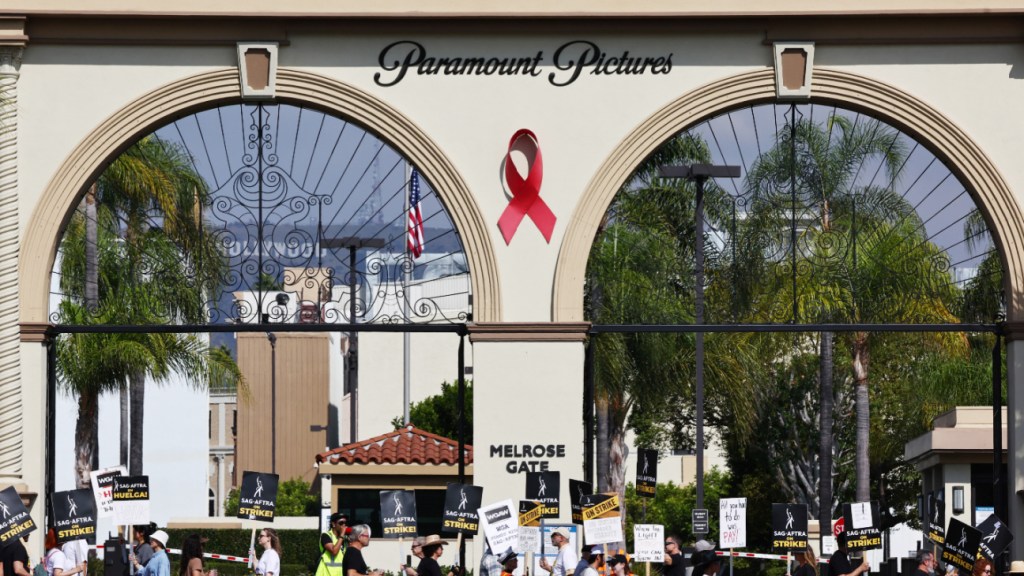Amid its quest to slim down its asset portfolio to scale up its core entertainment ambitions, Paramount Global hit 63 million global streaming subscribers in the latest quarter (up from 61 million as of the end of June) and kept narrowing losses in its direct-to-consumer segment to $238 million, a possibly encouraging sign for Wall Street.
The Bob Bakish-led conglomerate, home to Paramount Studios, CBS, Showtime, MTV, Comedy Central, BET and Nickelodeon, has battled the perception that it’s too small to compete at scale in streaming with giants like Netflix (247 million subscribers) or Disney+ (105 million core subs).
Overall, Paramount reported $621 million in operating income for the third-quarter, up 10 percent from the same frame a year ago. The company also disclosed “nearly $60 million of strike-related idle costs” in its latest quarter amid the Writers Guild of America and SAG-AFTRA strikes, CFO Naveen Chopra said. “These are incremental expenses incurred to retain production capabilities while the strike is ongoing.”
Its flagship streaming service Paramount+ is powered by Taylor Sheridan-universe shows like 1883 and Special Ops: Lioness, NFL games, Star Trek spinoffs and its new Fraiser update, but the direct-to-consumer division lost $424 million and $511 million in its last two quarters. In an effort to cut costs, the company has sunset its standalone Showtime app, raised prices and integrated the premium cable brand’s shows like Yellowjackets and Billions into Paramount+.
“We continue to execute our strategy and prioritize prudent investment in streaming while maximizing the earnings of our traditional business,” Bakish stated on Thursday, highlighting that he expects streaming losses this year “will be lower than in 2022 – meaning streaming investment peaked ahead of plan.”
Before issuing its earnings report, the company unveiled the timeline for the final episodes of its biggest show, Sheridan’s Yellowstone, which will bow on the Paramount Network in November next year. (The series, which streams on rival platform Peacock due to an early deal that leadership likely would do over, also is getting two more spinoffs, titled 2024 and 1924.)
Meanwhile, Paramount’s sale of Simon & Schuster (for $1.62 billion, to private equity firm KKR, which closed on Oct. 30) as well as shedding real estate assets like CBS’ New York BlackRock headquarters (sold for $760 million) and CBS’ Studio City (gone for $1.85 billion) have fueled speculation in some corners that it is a takeover target. Another asset that Paramount had been debating the future of: BET Media, which includes the BET channel, streamer BET+ as well as VH1 and BET Studios. In August, company took down a “for sale” sign for a majority stake in the unit after hearing bids for several months.
During its latest quarter, its filmed entertainment theatrical studio unit also swung to a loss of $49 million, compared to a gain of $5 million in Q2. Paramount cited “incremental costs incurred during production shutdowns and lower revenue from studio rentals and production services,” for the loss. Bakish also mentioned on an earnings call that the company’s film slate has been impacted by the SAG-AFTRA strike.
The quarter saw Tom Cruise’s Mission: Impossible – Dead Reckoning Part One find middling box office results ($567 million globally) and Teenage Mutant Ninja Turtles: Mutant Mayhem ($180 million) successfully reviving the franchise. The filmed entertainment division saw revenue rise to $891 million, up from $831 million the prior quarter when Transformers: Rise of the Beasts bowed at the box office en route to $438 million in theatrical receipts. The studio also singled out the PAW Patrol library “serving as a top engagement driver on Paramount+,” without citing figures.
In its linear TV media segment, home to the company’s collection of broadcast and cable networks, advertising sales fell 14 percent in the quarter, following a 10 percent decline the prior quarter. Lower political advertising was cited for the drop for the TV networks. Additionally, amid the dual strikes, licensing and other revenue fell 12 percent “driven by lower revenue from original content produced for third parties,” the company said.
On Wednesday, CBS revealed its new host, Taylor Tomlinson, and creative team for its next late night show, After Midnight. Meanwhile, Comedy Central’s marquee anchor’s chair at The Daily Show has yet to be filled while the series has leaned on guest hosts since Trevor Noah’s final show in December of last year.




